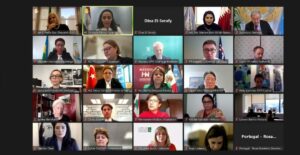President of Egypt’s National Council for Women (NCW) Maya Morsy presented “Egypt’s Global Perspective: Women, Environment, and Climate Change” at the 66th session of the United Nations Commission on the Status of Women (CSW66), March 9-25, 2022.
The CSW66 session is themed “Achieving gender equality and the empowerment of all women and girls in the context of climate change, environment and disaster risk reduction policies and programmes”.
Addressing the session, Morsy said ‘Egypt’s Global Perspective’ is based on seven actionable areas, which include promoting gender sensitive perspectives within adaptation, mitigation, and responses; strengthening women’s voice and their meaningful participation in environmental governance; leveraging opportunities for women within the environmental transition to green economy and green consumption habits and within blue economy in the context of achieving sustainable development; tackling differential health and social implications of environmental issues on women; promoting educational and behavioural change on women and climate change; promoting knowledge, data generation and analysis on women and climate change; and applying women-specific perspectives in financing for climate action.

Morsy, who is also head of the Egyptian delegation to the CSW66, stressed that Egypt is among the most affected countries by the implications of climate change, despite its very limited contribution to these implications. According to statistics, Egypt accounts for only 0.6 per cent of global greenhouse gas emissions.
She also referred to the national efforts and policies to protect the environment, for its importance in advancing sustainable development, and honouring the commitment to decent standards of living, in addition to Egypt’s commitment to relevant international conventions in this field.
The Egyptian Constitution stipulates that “Every individual has the right to live in a healthy environment. The protection of the environment is a national duty. The state is committed to taking the necessary measures to preserve it and rationally use its natural resources”, she told the session.
In light of the impact of climate change on women, particularly with regard to their health, food security and decent living standards, Egypt has taken several serious measures to implement a sustainable development model. It also established the National Council for Climate Change, she explained.
Furthermore, Egypt launched its Vision 2030, which includes the environment and the integration of women empowerment principles, as well as the National Strategy for the Empowerment of Women in the context of the pillars of protection and economic empowerment. Additionally, the National Strategy for Adaptation to Climate Change 2050 was recently launched.
The Egyptian government has launched several initiatives, programmes and projects to mitigate the effects of climate change, while taking into account women’s empowerment, she said.
The NCW chairperson referred to the “Hayah Karima” (Decent Life) initiative as “the largest development programme in Egypt and the world. Women and their needs are amongst the main pillars of the initiative.
“This programme also takes into account environmental dimensions and sustainability criteria. It allocates LE800 billion to 58 million citizens, 50 per cent of whom are women.
The National Egyptian Family Development Project has also been launched. It aims to improve the quality of life of the Egyptian citizens and families. The initiative allocates about LE2.9 billion to achieve this goal.”
Morsy invited all the participants in the CSW66 to visit Egypt and participate in COP27 (the 27th Conference of the Parties to the UN Framework Convention on Climate Change (UNFCCC), which will be held in Egypt in November.
On the sidelines of the CSW66, Morsy took part in the meeting of the Group of Friends for Gender Equality,’ which was attended by UN Secretary-General Antonio Guterres.
Addressing the meeting, Morsy thanked Guterres, for the UN efforts and its affiliate bodies to achieve equality of opportunities.
She also reviewed Egypt’s efforts towards women’s empowerment and gender equality, referring to the National Strategy for the Empowerment of Egyptian Women 2030, which comes in line with Egypt’s Vision 2030.
She also pointed to the launch of the National Strategy for Human Rights, of which women constitute a chief axis.






Discussion about this post